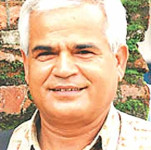
We use Google Cloud Translation Services. Google requires we provide the following disclaimer relating to use of this service:
This service may contain translations powered by Google. Google disclaims all warranties related to the translations, expressed or implied, including any warranties of accuracy, reliability, and any implied warranties of merchantability, fitness for a particular purpose, and noninfringement.




There were many political changes, but politics did not improve. Democracy is also the development of political culture. The expected political culture did not develop. How to improve politics? What are the remedies? The two major ruling parties, Congress and UML, have raised the issue of constitutional amendment.

Where is the fault, in politics or in the constitution? It needs to be cleared first. No constitution and the political system adopted by it is perfect in itself, politics is what accelerates it. The public perception that the cause of political disaster is mainly the people in political leadership is becoming widespread. Congress General Minister Vishwaprakash Sharma has brought a proposal for exit policy. Today this column will be relevant to discuss this topic.
Prime Minister KP Sharma Oli and Nepali Congress Chairman Sher Bahadur Deuba who participated in celebrating the Gaura festival in Tundikhel on August 10, were hooted by some of the youth who participated there. They chanted 'Oli Go, Balen Aau'. Oli expressed his sadness that 'the new generation does not care about decency and dignity'. Deuba said, 'This is your culture, did you learn this? They scolded him as a shameless scoundrel. The police is preparing to arrest some of these youths and prosecute them. How to take this event? Is this a sign of cultural abuse seen in the new generation as Deuba and Oli said? Rather than cultural, it indicates political discontent. Dissatisfaction is not controlled by locking and snarling some. It could explode instead. In that case, Oli, Deuba's arti sermons and reprimands will not work. On the contrary, it will be difficult to avoid them.
Nepal's parties are currently under intense pressure and conflict of generation. Its effect is not only on the old parties like Congress and UML, but the people also want a new leadership. People are used to seeing the same faces in power and politics for decades. The country has experienced Oli's bad governance and Deuba's worthless leadership many times. Maoist leader Prachanda is not an exception to this. They have lost the moral status to instill principles, ideals and culture in the people. It is because of them that the young generation of that party has also reached a religious crisis - to defend the leader or to press openly for leadership change? In such a situation, it is not so difficult to predict where the politics will go. But it is impossible to say what the expected-unexpected will be. The current canvas of politics is certain to be changed, it must be changed. It is the desire to go in the right direction through constitutional and democratic process.
Public responsibility can be strongly disagreed with, commented on and criticized, especially the work and behavior of people in political roles. It should be limited. I also don't like when someone behaves inappropriately on a public or personal level. But there are some public practices of politics where the boundaries of dignity cannot be determined. 'Zindavad, Murdavad' is a common slogan in politics. Slogans and black flag demonstrations against disliked leaders and officials are also considered normal. Oli and Deuba themselves may have raised such slogans and displayed the black flag in the past. His behavior was also undesirable for the then rulers. Today slogans are raised against them, black flags are displayed. Unexpected behavior keeps coming in open politics, it cannot be avoided, the main thing is to understand the underlying message. This is not the first time that a leader has eaten hooting in Tundikhel. The scene of that day was an unexpected event for the organizers and Oli Deuba. Based on this, it is not surprising that incidents like Bangladesh and Sri Lanka will be repeated in Nepal.
Meanwhile, Chairman of CPN Maoist Center Pushpa Kamal Dahal 'Prachanda' as the leader of the opposition party gave examples of Bangladesh and Sri Lanka in the parliament and criticized the government very seriously. His statement is not false, there is no need to dispute it. But the main question is, what is the moral basis of Prachanda, who has been the prime minister three times and has cooperated with the Congress and UML in the livelihood government, to raise those questions? Is he clear about the existing government malpractices, corruption and political deviations? The tradition of being the leader of the ruling party until the previous day, and becoming the leader of the opposition party the next day after leaving it, was not right. It not only weakens political ethics, but also causes it to collapse. Not only Prachanda, Deuba and Oli, whether they are in power or in opposition, do not have the moral standing to question these distortions. Therefore, the political party should break the tradition of the leaders of the opposition parties who have become prime ministers several times. Even in the opposition, the new leadership has the moral standing to criticize the government. This is also a matter of improving politics.
I don't see a chance for the leader to improve. Not only me, many people have written in this column that leaders, parties and politics should be improved. However, no improvement has been seen. Therefore, to improve politics, more than a dozen people who appeared on the surface should be removed from the party leadership. The old leaders are no longer believed to have improved, they should be thrown out. They themselves have lost time to take a dignified leave of absence. In this sense, the policy proposal of leadership exit presented by General Minister Vishwa Prakash Sharma in the party meeting in Nepali Congress is relevant. This is the proper way to protect the young leadership who have great potential due to the incompetent and spoiled leadership from the crisis of decay. This proposal is not only relevant for Congress but also for all parties including UML, Maoists. Such things are not prescribed by the constitution and laws, but by the party itself by establishing policies, rules and traditions. Sometimes there will be some exceptions, but politics can be improved only if the party establishes a healthy tradition.
Since the revolution of 2007 till now, the Nepali Congress and the Communist Party have been the bearers of political change in Nepal, the first responsibility for reforming politics is also theirs. If they do not, if they cannot, a new alternative should be initiated. People do not live without options. The signs of alternatives have been well seen in the last elections and by-elections. In a democracy, elections are the process that creates the political culture of the exit of the old and the arrival of new leadership. In our political parties, there is a tradition of considering the leadership as a patron. Workers call their leader as 'Great' and 'Achyut' to increase the pride of the party, this is a wrong political culture. There is no man who does not make mistakes and not all his mistakes are forgivable. In politics, there are more possibilities for mistakes. Therefore, politics is considered as a periodic task. Trying to make it a lifelong habit is wrong. It is surprising that when Deuba and Oli agreed to run the government by taking turns as prime minister, no one from Congress or UML dared to say, 'It is your turn, now we will run it'. The country is looking for a leadership with a capable team that can take risks, not a pawn. The reason why I emphasize the team here is because of the poor state of Nepal's economy and diplomacy. The fact that whoever becomes the Minister of Finance and Minister of Foreign Affairs is the cause of this bad situation.
Democracy is called accountable governance. It also requires responsible leadership. Political accountability is a very sensitive issue. If the decisions and actions of the political leaders are not correct, the people will have to suffer a lot, the politics of the country may be in turmoil. For example, you don't have to go too far, Sher Bahadur Deuba is an example. In 2059, he recommended the dissolution of the House of Representatives saying that elections would be held at a very unfavorable time, but the elections did not take place. His recommendation was in accordance with the then constitution, but it lacked political wisdom. He did not understand the court's moves or he followed them. As a result, not only did his power go, Gyanendra rule came through the back door. Similarly, in the year 2077/78, KP Oli recommended the dissolution of the House of Representatives and new elections even when there was no provision in the constitution. Both the Prime Minister's recommendation and the President's approval were invalidated by the Supreme Court as unconstitutional. The country was saved from a political and constitutional disaster. What are other examples of unresponsive leadership? A leadership that cannot justify itself in the court of time cannot be held accountable, it is considered a disgraced character in history.
If the leader is unresponsive, the party has not been responsive. Congress should have removed Deuba and Oli from the leadership in 2059 and UML after 2078 as partners in wrong decisions, but they made them more powerful. The organizational structure that suppresses the possibility of alternative leadership in the party from below is responsible for this. Reforms in politics require changes in party organization structure, membership distribution and leadership selection process. There are some legislative matters, which can be amended and changed. But the main thing is to establish internal democracy and a corresponding political tradition within the party.
politics is not like the Tamsuk between bad Baji Sahu and Nireh Asami. It should be based on public expectations and public opinion. Sometimes public opinion may not be prudent. It becomes a situation where good people lose elections and bad people win. But if good traditions are established within the party, politics will be saved, good people will get a chance. In Britain, two years ago, Liz Truss became the Prime Minister by the popular vote of the party. She resigned from the post within 50 days without being tested as to whether she was a good or bad Prime Minister. His economic policies were not liked by the party and his own ministers. Realizing her weakness, she withdrew. Even the voters of the constituency did not like her, she lost in the last parliamentary election. Perhaps he will never get a chance to become the prime minister again. She has become an example of 'bad politics and incompetent prime minister'. It is not politics, it is forced.
I am not in favor of arguing here about who is right or wrong among those who say Oli, Deuba, Prachanda or the like are leaders. Their leadership and work has been seen. People did not like it. It does not make sense to say 'I have been elected as the Prime Minister, Party President/Chairperson through the Constitution/Constitutional democratic method' under the guise of the technicalities of the Party Constitution and the Constitution. The law/constitution has been trampled underfoot by these leaders. He can change the constitution of the party himself,
is also adept at misusing the constitution to suit their own interests. Therefore, those who have made a promising face for leadership within the party should not delay in adopting a solid policy of exiting the leadership no matter what the pressure is.
Vishwa Prakash has proposed to set a limit of 'President once, Prime Minister twice, Minister three times and MP four times'. In general, there should not have been a situation where the policy had to be made after passing the resolution, it would have been better for the party leaders to take the lead and establish a healthy tradition in such matters. In the proposal, it says 'time' instead of term. I guess this word choice is deliberate. In the case of other than the Prime Minister, it targets tenure itself. Why should it be said twice, it is worth considering. There is no record of any elected Prime Minister in Nepal completing even one term. But the opinion has been established that Deuba, Oli and Prachanda will never leave as long as they live.
Why do leaders want to keep power in their personal grip? It is important to seriously understand why they are not ready to leave another ally of their own party. Politics is mired in corruption. He is afraid that he will be investigated. In order to protect oneself from that and to protect one's own, one needs a constant reluctance of power. It has been almost two hundred years, what the British historian Lord Acton said while evaluating the rulers in the nineteenth century is still as persuasive, he realized. He said, "Power leads to corruption, the more power there is, the more corruption increases." The leader does not control the party, the party should control the leader to improve politics.
 प्रकाशित : भाद्र २०, २०८१ ०८:४६
प्रकाशित : भाद्र २०, २०८१ ०८:४६

 २२.१२°C काठमाडौं
२२.१२°C काठमाडौं















